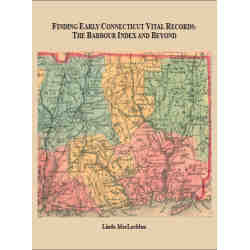
For this issue of “Genealogy Pointers” we are once again highlighting sage advice for genealogists from America’s most respected author/teacher Val Greenwood. Below, we have included excerpts of Mr. Greenwood’s recommendations—indicating chapters and page numbers from the 4th edition of The Researcher’s Guide to American Genealogy–pertaining to immigration and passenger records, Revolutionary War and other military records, agricultural census records, and more! If you haven’t purchased your copy of the new edition of The Researcher’s Guide, the following recommendations may just sway you to do so.
Passenger Arrival Records (chap. 25, p. 626)
We are fortunate that passenger lists are not the only possible source of information about ancestral homes. Court records of various kinds, especially those relating to naturalization and citizenship, are especially significant. Land entry records in the public domain, certificates of vital events, obituaries, probate records, military records, church records, and others (including old letters and family records) may contain the needed information. If so, your problem is less difficult. Consequently, you need to keep your eyes open for this information on foreign origin from the very inception of your research.
Passenger/Immigration Records (chap. 25, p. 649)
As with all records we use in our research, records relating to immigration are not perfect. Because of that lack of perfection, there are certain issues to consider as you plan your research strategy. Errors were made at the time the records were created, and errors were also made when those records were being indexed and/or compiled for publication or for ease of use.
One of the first problems to consider is the proper understanding of names. There may be spelling problems—in both original documents, in compilations, and in indexes. In your search of these records for information relating to your ancestors, you must not only be flexible, but you must also use your imagination to cover relevant possibilities. The spelling issue is compounded when you consider that many immigrants did not speak English, and many of those clerks who recorded names in those records did not speak or understand the languages of the immigrants.
Other issues also require sensitivity as you search these records. It is helpful to know when your ancestor was born (at least an approximate time) to help you distinguish him from other immigrants with the same name. You should know something of his ethnic background and the political history of his country of origin that might be significant in helping you locate the correct record. Also, the more specific you can be about the date of his immigration, the more likely you are to find the correct record. Even when the records are indexed, it is helpful to know the approximate year of immigration. In this regard, remember that the 1900 and 1920 censuses… tell the year of immigration for all immigrants.
Revolutionary War/Military Records (chap. 26, p. 681)
Perhaps your people were in America before the Revolution but you can find no evidence of service by them. There may be a number of reasons for this, including the possibility that they belonged to a pacifist church such as the Society of Friends (Quakers). But, on the other hand, there is also the possibility that they were sympathetic to the cause of the Crown rather than to that of the revolutionaries.
If you do not know where your ancestors were during the Revolution because you have not traced them that far, but you find them coming out of Canada (or even Florida or the West Indies) in later years, the same possibility exists. It is estimated that as many as one-third (some say one-half) of the colonists were loyal to the Crown. Among the Loyalists were British government officials and their friends, English Church ministers, and others whose positions and/or wealth depended on British sovereignty.
Military Records (chap. 27, p. 725)
If your ancestor lived at a time when he could have served in a war (or if any close relatives of his [or hers] could have served in a war) you must consider a search of military records as a research necessity. Do not wait until you find a clue that your ancestor had military experience. Just make your search in the records of the appropriate war and see what you discover.
However, any clues about military service you have can be helpful. They can help you focus on your target with greater accuracy. I have mentioned many times the increased usability of military records when you have specific data on the organization to which the serviceman belonged, or at least the state from which he served. Such clues can be found in various places—family records, old letters, Bibles, tombstones, obituaries, local histories, church records, vital records (especially death certificates), etc., are all likely sources. In addition, where Civil War service records are concerned, you must know the state in order to use the records.
Agricultural Census Records (chap. 14, pp. 374, 375)
All 1850 through 1910 censuses included agricultural schedules. However, the schedules for 1900 and 1910 were destroyed by congressional action in 1919. These agricultural schedules contain information on every farm with annual produce worth $100 or more and include the name of the owner or tenant, the kind and value of the acreage, machinery, livestock, and produce in considerable detail….
Though agricultural schedules have been little used by genealogists in the past, they have taken on new life as researchers have become more interested in the historical side of their families. As they seek to understand more about their ancestors’ lives, they have found a significant source of information about the lives of these people who lived in our early, agriculturally oriented society.
Guardianship Records (chap. 18, p. 466)
“Another type of situation that suggests the need to investigate guardianship records is where a young person comes of age, marries, and secures property in a locality, but there is no indication in other records of his being connected to anyone in an earlier generation. The reason for this lack of connection may be that his parents died when he was young. You should never hesitate to check guardianship records when you find a situation like this; they may hold the answer to your problem.”
Church Records (chap. 24, p. 611)
Church records are of no value if you cannot find the ones that fit your specific problems. In America, where church and state are separate and where people with ancestry from all over Europe lived side by side and intermarried, there are two main problems:
- Determining the church with which your ancestor was affiliated.
- Locating records of that church in the locality where your ancestor lived.
Clues to solve the first problem might come from many sources. Perhaps the family’s present affiliation can help you, or the national origin of the family, or even family tradition. You might also find your answer in a will or a deed or on a tombstone. It may be in an obituary. Or there may be a clue in the locality where your ancestor resided—it may have been the settlement of a particular religious denomination—but you must know the locality’s history to determine this.
Some people belonged to several churches during their lives. This was quite common on the frontier, because if a town had only one church, that church was usually where the town’s residents (especially the Protestants) attended worship services, regardless of former affiliation. In later years obituaries, death certificates, hospital records, etc., contain statements of religious preference.
[av_image src=’https://genealogical.com/wp-content/uploads/2018/08/2017-11-08-03-38-36.7529f9d688745e80410f20088a3ddb85ac977f14-225×300.jpg’ attachment=’5256′ attachment_size=’medium’ align=’center’ styling=” hover=” link=’manually,https://library.genealogical.com/printpurchase/3napy’ target=” caption=” font_size=” appearance=” overlay_opacity=’0.4′ overlay_color=’#000000′ overlay_text_color=’#ffffff’ animation=’no-animation’ admin_preview_bg=” av_uid=’av-4jqr00′][/av_image]
[av_button label=’View 4th Edition of The Researchers Guide to American Genealogy’ link=’manually,https://library.genealogical.com/printpurchase/3napy’ link_target=” size=’large’ position=’center’ icon_select=’yes’ icon=’ue84f’ font=’entypo-fontello’ color=’theme-color’ custom_bg=’#444444′ custom_font=’#ffffff’ admin_preview_bg=” av_uid=’av-38zkv4′]




